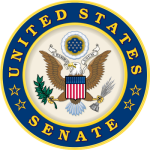- Branża: Government
- Number of terms: 4127
- Number of blossaries: 0
- Company Profile:
The United States Senate is the upper house of the United States Congress. The composition and powers of the Senate are established in Article One of the U.S. Constitution. Each U.S. state is represented by two senators, regardless of population. Senators serve staggered six-year terms.
A bill which is drafted by a committee. It is introduced by the committee or subcommittee chairman after the committee votes to report it, and it is placed directly on the Senate's Calendar of Business.
Industry:Government
The fiscal year is the accounting period for the federal government which begins on October 1 and ends on September 30. The fiscal year is designated by the calendar year in which it ends; for example, fiscal year 2006 begins on October 1, 2005 and ends on September 30, 2006. Congress passes appropriations legislation to fund the government for every fiscal year.
Industry:Government
Informal term for any attempt to block or delay Senate action on a bill or other matter by debating it at length, by offering numerous procedural motions, or by any other delaying or obstructive actions.
Industry:Government
A temporary, ad hoc panel composed of House and Senate conferees which is formed for the purpose of reconciling differences in legislation that has passed both chambers. Conference committees are usually convened to resolve bicameral differences on major and controversial legislation.
Industry:Government
A meeting of a committee or subcommittee -- generally open to the public -- to take testimony in order to gather information and opinions on proposed legislation, to conduct an investigation, or review the operation or other aspects of a Federal agency or program.
Industry:Government
The presiding officer of a committee or subcommittee. In the Senate, chairmanship is based on seniority of committee tenure, but a Senator may not chair more than one standing committee.
Industry:Government
An appointment by the President to executive or judicial office that is subject to Senate confirmation.
Industry:Government
Once legislation has passed both chambers of Congress in identical form, been signed into law by the President, become law without his signature, or passed over his veto, the legislation is enacted.
Industry:Government
The Constitution grants the President 10 days to review a measure passed by the Congress. If the President has not signed the bill after 10 days, it becomes law without his signature. However, if Congress adjourns during the 10-day period, the bill does not become law.
Industry:Government
A Federal program or provision of law that requires payments to any person or unit of government that meets the eligibility criteria established by law. Entitlements constitute a binding obligation on the part of the Federal Government, and eligible recipients have legal recourse if the obligation is not fulfilled. Social Security and veterans' compensation and pensions are examples of entitlement programs.
Industry:Government
